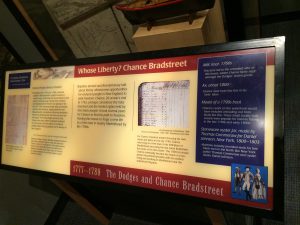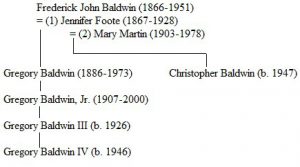 As the White Rabbit said in Alice in Wonderland, “The hurrier I go, the behinder I get.” We’ve all been there. The good news is that two new Early New England Families Study Project sketches are being posted to Americanancestors.org this week: John Hollister of Wethersfield and Thomas Nichols of Hingham. In addition, two second-version treatments are also being posted: Samuel Jenney of Plymouth and Dartmouth, and Joseph Andrews of Hingham. Continue reading ‘The hurrier I go’
As the White Rabbit said in Alice in Wonderland, “The hurrier I go, the behinder I get.” We’ve all been there. The good news is that two new Early New England Families Study Project sketches are being posted to Americanancestors.org this week: John Hollister of Wethersfield and Thomas Nichols of Hingham. In addition, two second-version treatments are also being posted: Samuel Jenney of Plymouth and Dartmouth, and Joseph Andrews of Hingham. Continue reading ‘The hurrier I go’
Category Archives: Genealogical Writing
Updating an exhibit

In 2010 I visited the Smithsonian National Museum of American History. An exhibit that caught my eye was called Within these Walls, which told the stories of five families who lived in a house in Ipswich, Massachusetts for more than two centuries. The period covered ranges from the Choate family as American colonists in the 1750s to the Scott family during the Home Front of the 1940s. The second family covered, under the period of “Revolutionaries – 1777–1789,” was the Dodge family, under the heading “the Dodges and Chance.” The Dodge household included an African-American man named Chance, as noted in Abraham Dodge’s 1786 will, where Abraham left his wife Bethiah “all my Right to the Service of my Negro Man Chance.” At the time I saw this exhibit, that reference was essentially all the show’s curators knew about Chance. Continue reading Updating an exhibit
Famous namesakes

Last month, I wrote about the tradition of given names. I postulated that given names were either chosen by parents because they honored a family member (both living and deceased) or because parents liked the way a name sounded, and subsequently named their child after “a stranger they met in a bar” (thank you to commenter Deane Taylor). In fact, when the blog posted to Vita Brevis, many of the commenters verified my theory: most were named for complete strangers or in loving memory of family and friends. However, a third group also emerged from the comment section: those who were named for a famous person, event, or cultural icon (thank you to commenters Carole and Carole).
And, when my colleagues read the blog, they shared similar stories of their given name’s cultural significance: Continue reading Famous namesakes
Obituaries
 The last thing, literally, any of us wants to think about is writing obituaries.
The last thing, literally, any of us wants to think about is writing obituaries.
Even if we have very elderly or very sick loved ones and know that the time is near, it seems eerie and sacrilegious to think about preparing an obituary while they are still living, perhaps even tempting fate and hastening death!
None of us, hopefully, will have to write a lot of obituaries. I’ve written them for my parents, but they or their siblings wrote them for my grandparents, and the rest of my relatives have nearer loved ones to whom that task will fall. Continue reading Obituaries
De-lovely

My great-grandmother’s maiden name was Beeckman – not the more fashionable Beekman,[1] as in Beekman Place – a name which enjoyed something of a vogue around the turn of the last century, in the person of my great-great-uncle Robert Livingston Beeckman (1866–1935). Uncle Livy had couple of claims to fame in his lifetime – he was a nationally-ranked tennis player during the 1880s, and he served as Governor of Rhode Island (with some touting him for the presidency in 1920) – but for me the more intriguing connection comes later: his first wife was Eleanor Thomas, whose brother married the future Mrs. Cole Porter. Continue reading De-lovely
Readers vs. editors
 Every writer can benefit from the services of an editor, but professional editors are expensive. If you have an article accepted for publication in the Register, your article will have the benefit of being edited by Henry Hoff, FASG, free of charge. You won’t be paid anything for the article, but Henry will assure that it is in proper form to do both you and the Register proud.
Every writer can benefit from the services of an editor, but professional editors are expensive. If you have an article accepted for publication in the Register, your article will have the benefit of being edited by Henry Hoff, FASG, free of charge. You won’t be paid anything for the article, but Henry will assure that it is in proper form to do both you and the Register proud.
An editor’s job ranges from assuring that the article as a whole makes sense and proves its point to setting up the format, footnotes, and other fiddly things to match the publication’s style rules. Trust me, it’s the fiddly things that usually count the most! Continue reading Readers vs. editors
Generational spread
 A (non-genealogical) post I read recently involved someone referring to a relative of an older generation as a “second cousin.” I asked further about the kinship, and this person was actually the author’s mother’s first cousin, and thus the author’s “first cousin once removed,” which is a common mistake in kinship assignment. However, it got me thinking about how much “generational spread” can occur even in a comparatively short period of time. Continue reading Generational spread
A (non-genealogical) post I read recently involved someone referring to a relative of an older generation as a “second cousin.” I asked further about the kinship, and this person was actually the author’s mother’s first cousin, and thus the author’s “first cousin once removed,” which is a common mistake in kinship assignment. However, it got me thinking about how much “generational spread” can occur even in a comparatively short period of time. Continue reading Generational spread
Finding Hattie
Recently, while leafing through an old album of my father’s family, I came across two large adjacent cabinet card photos of a couple I didn’t know labeled “Hattie Gordon” and “Lawrence Gordon.” There is only one Hattie Gordon (Harriett Frances Gordon Cony, 1849–1922) in my family tree, and this lady is not she; there is no Lawrence Gordon, either. Had I missed some cousins? An aunt or uncle, long-lost or abandoned? Maybe they were just good friends of the family. The questions began circling. No one I asked recognized these people or their names. Of course, I had to figure out who they were and why they were in this album (organizing materials can wait, right?). Continue reading Finding Hattie
JSTOR.org
 In days of yore, when I was in college, locating published articles on historical topics required hours sifting through library stacks and individual journal indexes, then laboriously photocopying each page of each article. Thankfully, in today’s digital world, we have JSTOR.org, with instant access to full indexes of every journal in their collection (not limited to historical titles) and the ability to download PDF files of the articles to our desktop and print at home. Continue reading JSTOR.org
In days of yore, when I was in college, locating published articles on historical topics required hours sifting through library stacks and individual journal indexes, then laboriously photocopying each page of each article. Thankfully, in today’s digital world, we have JSTOR.org, with instant access to full indexes of every journal in their collection (not limited to historical titles) and the ability to download PDF files of the articles to our desktop and print at home. Continue reading JSTOR.org
New Englanders in the South

Earlier this month I went to the National Genealogical Society conference in Raleigh, North Carolina; it was my first time in the Tar Heel State. While I have many southern ancestors who started out in Virginia and Maryland before heading west, none of them – as far as I have found – lived in North Carolina or further south. However, through some of my New England ancestry in Connecticut, I have a brief connection to North Carolina in the late seventeenth century. While not necessarily the “normal” migration, there are several cases of New Englanders going south rather than west, many times settling there permanently. Continue reading New Englanders in the South

